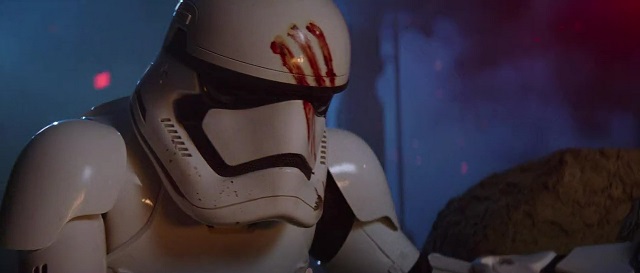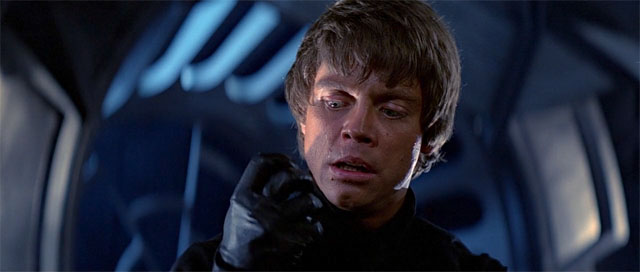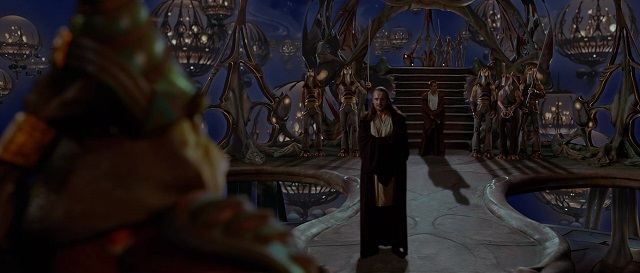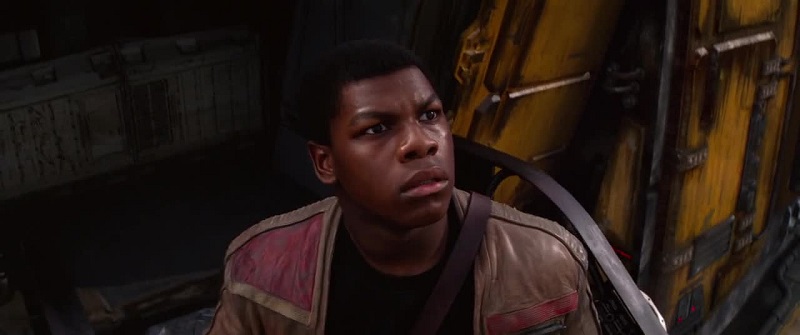
It’s almost timeless in its use. In Beauty and the Beast, a prince and his castle were cursed for failing it. In Tales From Watership Down, the folk hero El-ahrairah tested the integrity of a warren through it. In Hebrews 13:2, the Bible says that some have entertained angels by passing it.
This is the test of compassion.
It’s the moment when a character encounters an individual who is undesirable to or unvalued by society in some way. Helping or showing compassion to this individual appears, on the surface, to pull time and effort away from the character’s goal. The test is: will the character divert from their path to help this individual, or will they continue on their way? Their choice in this matter reveals their true self and results in consequences.
Probably the most iconic test of compassion in Star Wars takes place in The Empire Strikes Back, when Luke is tested by Yoda, who is currently concealing himself as an annoying local. When Luke’s impatience overrides, at last, his mask of politeness, he fails the test, which nearly costs him his Jedi training. By the time Return of the Jedi rolls around, he’s learned his lesson and applies it on a much larger scale, twice.
The first is with the Ewoks. Sam Witwer, voice actor for multiple Star Wars roles, had a brilliant analysis of the role of Luke and the Ewoks:
“…the fairy tale aspect of the insignificant… little creature that no one pays attention to is actually what you need to help you overcome the great evil. Well, it’s the Yoda lesson. It’s the Yoda lesson from The Empire Strikes Back that Luke ignored, that he underestimated the little puppet, and that ended up being the wisest man in the universe.” (Far, Far Away Ep 59 on Geek Nation, 24:45)
Witwer goes on to explain that Luke recognizes the situation with the Ewoks as that lesson and works to keep the rest of the rebels calm until they can learn it too.
“And finally by the end of it, when they’re doing the whole thing with the tribe…there’s a very smart little sequence of events where the Ewoks are all talking, and Leia goes ‘what’s going on?’ And Han has no idea and you cut to Luke, and he knows what’s going on. He’s like ‘that’s why I was here. To apply the lesson I learned in the last film to here, long enough for us to become friends with these guys. Now I have to go save my dad.’” (Far, Far Away Ep 59 on Geek Nation, 24:45)
Luke passing the test of compassion here, and guiding his friends through it, gives the Rebellion the allies they need to take down the Death Star’s shield.

The second test of compassion in Return of the Jedi is, of course, the redemption of Vader. Aside from the Emperor himself, no one was more undesirable to the galaxy, and Luke’s effort to bring Vader back to the light seems to run contrary to the very goals of the Rebellion. But, in answering this test, that even Yoda and Obi-Wan urged him to fail, Luke brings about the redemption of his father and the destruction of the Sith.
In the prequels, we got a slightly different take on the test of compassion. With Luke, there was an in-canon arbiter to acknowledge his passing or failing of the test. Even when Yoda and Obi-Wan urged him to kill Vader, they still appeared at the end of Return of the Jedi to acknowledge his correct choice. Such arbiters in the prequel trilogy are all but absent, befitting the de-romanticizing of the Jedi Order that takes place in those films.
Here, the arbiters of the original trilogy actually find themselves at odds with the one arbiter we find in the prequels: Qui-Gon Jinn.
“As Qui-Gon and Obi-Wan prepare to leave Otoh Gunga to continue their important mission in [The Phantom Menace], Qui-Gon pauses and invokes a life debt to save Jar Jar Binks’s life from Gungan punishment. An impatient Obi-Wan tries to stop this, and later in the film – in reference to Jar Jar – calls Anakin ‘another pathetic life form.’ Qui-Gon’s willingness to help those in need, even clumsy and annoying beings like Jar Jar, frustrates Obi-Wan. Yet it is Jar Jar who ultimately brings the Naboo and Gungans together, showing a worth that nobody had foreseen … except for one person. Small acts of mercy and compassion can be as important as fighting an invasion.”
Obi-Wan and Yoda both learn from Qui-Gon, which propels them onward to become Luke’s arbiters in the original trilogy, but Qui-Gon’s death and the shrouding of the Force in The Phantom Menace means that there is no arbiter left in this era of Star Wars. As such, the arbitration of whether or not a character passes the test of compassion is left up to the audience, who has no power to guide the characters to better choices. Almost as if we are Qui-Gon himself: unable to manifest physically, and forced to watch the Jedi and the Republic fall apart, watch Anakin slaughter a village, watch an unjust war twist good people into collaborators, and watch test after test of compassion failed or denied for the “greater good” until evil wins.

In The Phantom Menace, Qui-Gon is established as an arbiter of the test of compassion because of the way he treats undesirables – Jar Jar and Anakin especially. He constantly passes without difficulty. He is Luke in Return of the Jedi, the one who would guide others through the test.
At the beginning of the sequel trilogy, the galaxy is in a similar state to the beginning of the Clone Wars: there is no arbiter for the test of compassion. Luke is gone. The Force itself has become dormant, “seemingly quieted to those able to sense its presence” (The Force Awakens: The Visual Dictionary, quote taken from Slashfilm). From the state of the galaxy, we know that we are again at a point in which tests of compassion were failed time and again, as it was during the Empire’s rise.
And in this silence, with no arbiter, from the very depths of the First Order, someone passes the test.
A stormtrooper, an expendable, unvalued cog in the First Order, falls. The other troopers around him rush onward to battle, to complete their mission, except for FN-2187. He sets aside his duty to help someone who is considered worthless. This is the first moment that sets Finn apart from the rest of the stormtroopers, a test of compassion. And the consequence of passing it is that Finn wakes up.
The sound shifts drastically in the moments following the trooper’s death. The camera holds close on Finn’s helmet, the chaos of the village is disorienting in both noise and visuals, and we hear his strained breathing. It feels claustrophobic. It feels like waking up in a panic from a horrid dream.
From this point on, throughout the film, Finn is afraid. His goal is to get away from the First Order, to go into hiding. Yet the test of compassion keeps calling to him, and every time, he answers. After Poe “dies”, Finn helps to get BB-8 away from the First Order, helps to complete Poe’s mission. When Rey is captured, Finn finds a way to get himself back to the First Order’s very base to save her. Not only does the test call him to divert from his goal, but it calls him back into the sights of the First Order. And even afraid, Finn never fails to answer.

Finn has not yet achieved the status of arbiter over the test yet; even in passing, he still struggles with his decisions, and in the small details that have been released for The Last Jedi, we know that Finn still wants to run. Yet there may be an opportunity for him to become that arbiter in Episode VIII, as he is partnered with Rose Tico, a mechanic who thinks of herself as a “nobody”. She looks up to and admires Finn, putting him into a role to be a potential teacher, to perhaps guide her through a test of her own.
Not only would this be a fitting continuation of Finn’s personal story, but it would fit the atmosphere of the sequel trilogy itself. The First Order has torn away critical parts of the universe, but newly awakened, the Force has begun to restore that which was lost. The legacy of the Jedi calls to Rey. Leia finds family in Poe. And Finn appears to be on the path to becoming the arbiter the galaxy so desperately needs.
The test of compassion is what truly sets apart the heroes in Star Wars. The manner of testing has evolved through the eras, and the arbiters have changed, but the results are always the same. Passing the test, in ways both large and small, brings the story back to the light. Luke learned by failing it and redeemed a galaxy. Qui-Gon was established through the testing of it and raised up two new arbiters in his place. Finn broke free by passing it and perhaps reawakened the Force itself.

Abigail, you are a truly gifted writer in both brevity (like this) and your blog (which I have been devouring for days). Simply incredible!
Thank you! I appreciate the read!
This is great–I love the connections you’ve drawn!
My only question: Does it make sense for Finn to become the arbiter of compassion? The previous arbiters have all been mentor figures–as you point out, Luke surpasses his mentors here, but they still appear “to acknowledge his correct choice.” With Finn as a main character rather than in a supporting, mentor role, can he move into the space of arbiter?
On a different note: What of Luke and the portrayal we’ve seen of him in The Last Jedi trailers? What does it an ex-standard bearer of compassion look like, and what are the implications there?
I wouldn’t be surprised if Finn ends up being the compassion that pulls/keeps Rey from abusing her power. Star Wars that centers on love/compassion/friendship — I could see where Finn ends up being the moral/emotional support for the main character that is Rey.
I definitely agree that Finn would bring out the best in Rey, like Rey brought out the courage in Finn in the Force Awakens.
I’d argue that both Finn and Rey are the main characters, as their arcs and their very presence (“WHAT GIRL?” “TRAITOR!”) were given equal weight in The Force Awakens. Not only that, but we also had similar introductions to them. There’s a great piece on StarWars.com about how Rey’s intro had a story all its own.
(http://www.starwars.com/news/how-reys-introduction-in-the-force-awakens-tells-its-own-story)
Now Finn’s intro is split up a bit because other characters are being established around him, but it’s still one that introduces his backstory without him saying a word until the very end, requiring us to rely on how he interacts with his surroundings to make a connection.
Thanks for reading!
Thanks!
I think it is possible to have a main character as an arbiter. We have seen Luke already act as an arbiter with the Ewoks – that was a lesson he had already learned and he guided his friends through to the right end. Neither Obi-Wan nor Yoda stopped by to acknowledge his actions there; Luke simply knew when that particular test was done.
To poke my head outside of Star Wars, we’ve seen arbiters take leading roles before in other scifi franchises. Just look at the Arbiter in Halo 2! …kidding. That’s a completely different type of role there…
A better, non-facetious example would be Benjamin Sisko from Deep Space 9. He’s a faceted and interesting character who still grows over the course of the series, but he’s also the moral guide for the rest of the crew and literally a spiritual guide for Kira Nerys in particular. Finn can be an arbiter and still have a character arc of his own.
As for Luke’s appearances in The Last Jedi trailers, I’d like to point again to Sisko. There were a number of points in Deep Space 9 where Sisko lost his own moral footing and had to be called on it. But once he got back to his feet, his role was still there. And redemption/second chances are ingrained in the Star Wars universe very heavily. So I’m not without hope that Luke could reclaim that mantle too.
I think I’ll be holding off on speculating too much though in regards to Luke’s portrayal or interpreting what it could mean for this particular trend in Star Wars. After all, Lucasfilm does like to hold a lot back in these trailers, and there are just to many unknowns to try to “solve for x,” as it were.
Thanks for reading!
Excellent observations!
Great post! I completely agree. FYI, the Stormtrooper you mentioned was FN-2003, Finn’s squadmate.